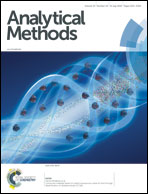Do we need a catalyst in the determination of dissolved organic carbon in environmental samples?
Abstract
The high temperature oxidation (HTO) technique is at present the preferred method for analysis of dissolved organic carbon (DOC) in environmental samples. There are two modes of oxidation being used, one with a platinum catalyst and the other without it. In this study, the performance of the HTO carbon analyzer has been compared in the presence and absence of a platinum-based catalyst. Analyses of natural water samples and reference standards show that removal of the catalyst results in lower oxidation efficiency in samples of high organic content. As a result, different calibration slopes were obtained. A measurable difference between DOC values obtained with and without the catalyst occurred at concentrations above 0.3 mM C.



 Please wait while we load your content...
Please wait while we load your content...